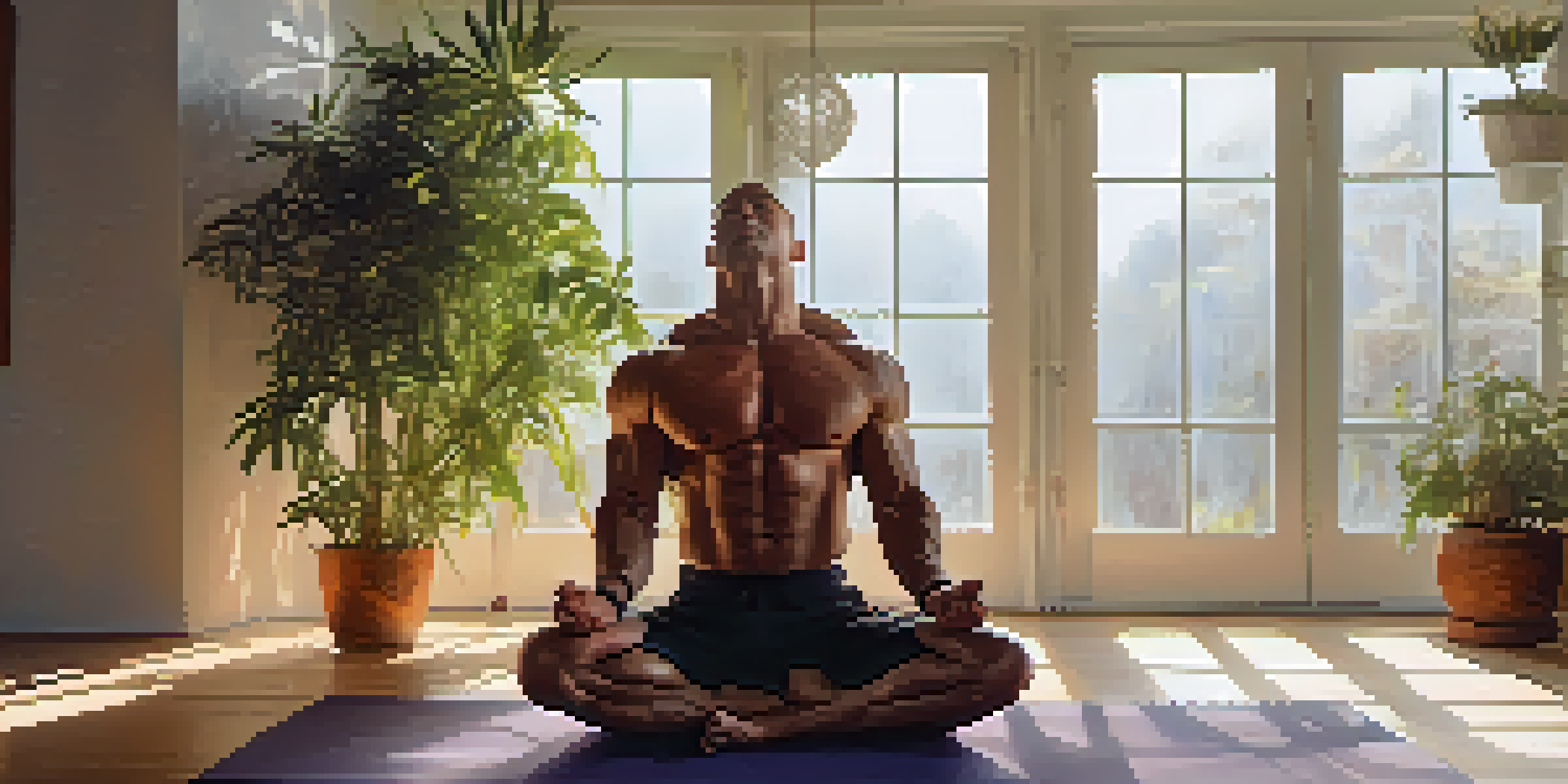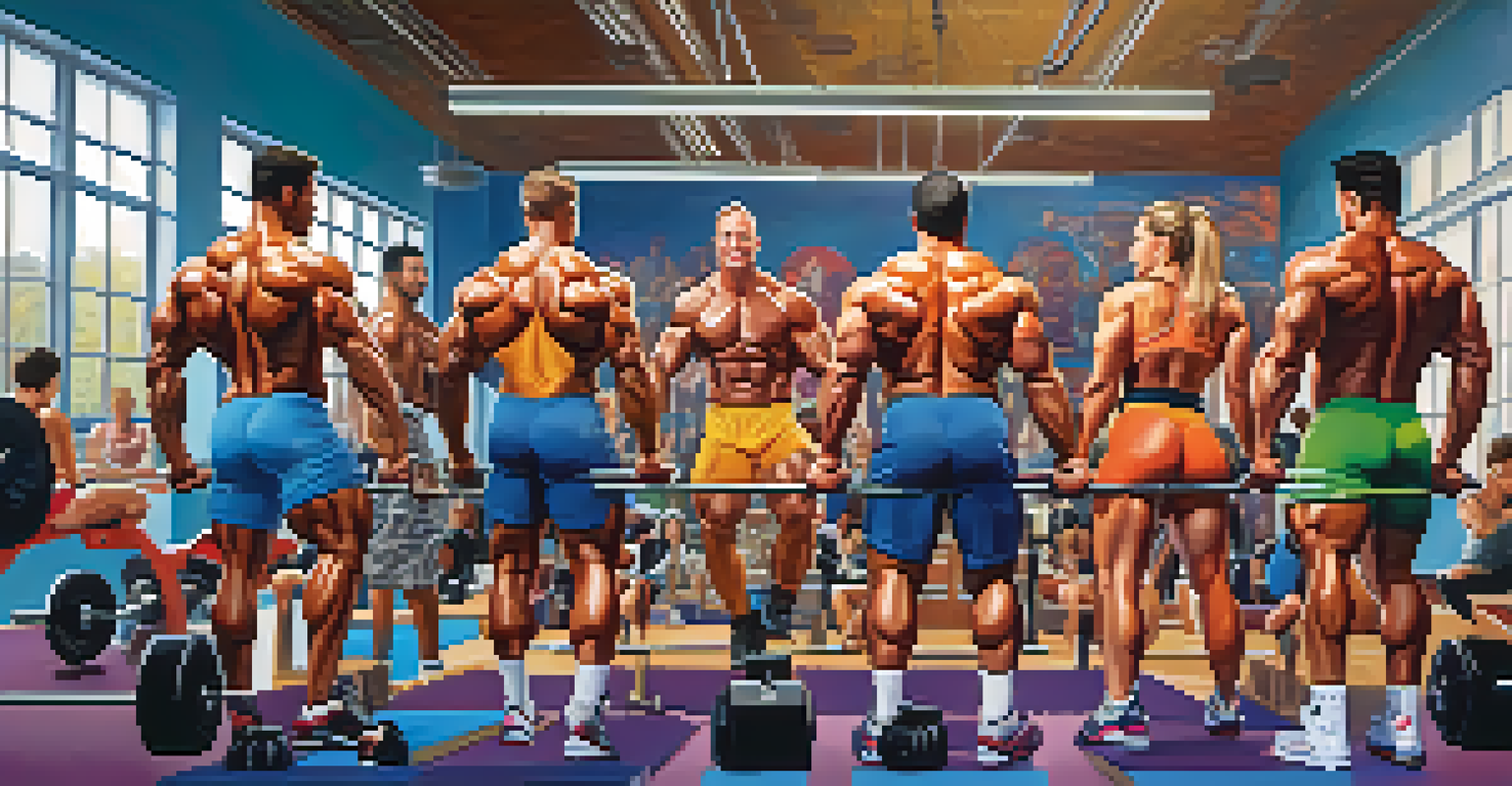The Dark Side: Bodybuilding and Body Image Issues

Understanding Bodybuilding and Its Popularity
Bodybuilding has exploded in popularity over the past few decades, attracting individuals of all ages and fitness levels. The allure often lies in the promise of physical transformation, strength, and confidence. However, while many find empowerment through bodybuilding, it can also lead to unrealistic expectations about body image.
The greatest glory in living lies not in never falling, but in rising every time we fall.
As social media platforms showcase idealized physiques, it becomes easier for aspiring bodybuilders to compare themselves to these often-filtered images. This constant comparison can distort one's self-image, leading to dissatisfaction with their own bodies. It's crucial to recognize the fine line between inspiration and unhealthy aspiration.
Ultimately, understanding the popularity of bodybuilding requires looking beyond just physical gains; it necessitates considering the psychological impacts that come with striving for an ideal body. The broader community must foster an environment that values health and well-being over a singular focus on aesthetics.
The Pressure of Ideal Body Standards in Bodybuilding
In the world of bodybuilding, there is an unspoken pressure to conform to specific body standards. Competitors often feel compelled to achieve a muscular, lean physique, which can lead to intense training regimens and strict dieting. This pressure can create a cycle of obsession where individuals constantly chase an elusive ideal.

The desire to meet these standards can lead to unhealthy behaviors, including extreme caloric restriction or over-exercising. For some, this can escalate into eating disorders, which can have devastating effects on both physical and mental health. Recognizing these harmful patterns is essential for anyone involved in the bodybuilding community.
Bodybuilding's Impact on Self-Image
Bodybuilding can empower individuals but also foster unrealistic body image expectations, particularly influenced by social media.
Moreover, the emphasis on aesthetics can overshadow the importance of overall health. It's vital to promote a more holistic approach to fitness that celebrates all body types and encourages balanced lifestyles, rather than rigid adherence to idealized standards.
Mental Health Challenges Linked to Bodybuilding
While bodybuilding can boost confidence and discipline, it can also lead to significant mental health challenges. Many bodybuilders experience body dysmorphia, a condition where they perceive their bodies as flawed, despite external validation. This distorted self-image can result in anxiety and depression.
What lies behind us and what lies before us are tiny matters compared to what lies within us.
The competitive nature of bodybuilding can exacerbate these issues, as competitors often feel they must constantly improve their appearance to succeed. The fear of not measuring up can lead to burnout or withdrawal from the sport altogether. It's important for individuals in this arena to prioritize their mental well-being alongside their physical goals.
Additionally, fostering open conversations about mental health within the bodybuilding community can help break the stigma surrounding these issues. By encouraging support and understanding, we can create a healthier environment where individuals feel safe to discuss their struggles.
Social Media's Role in Body Image Perception
Social media has transformed the way we perceive and engage with bodybuilding. Platforms like Instagram and TikTok showcase impressive physiques and fitness journeys, but they can also distort reality. The curated nature of social media often presents an unrealistic portrayal of body image and success.
Many individuals may find themselves feeling inadequate after scrolling through these feeds, leading to negative self-talk and feelings of envy. This can perpetuate a harmful cycle where users feel pressured to conform to these idealized images, often at the expense of their mental health. It's crucial to approach social media with a critical eye.
Mental Health Challenges in Bodybuilding
The competitive nature of bodybuilding can lead to significant mental health issues, including body dysmorphia and anxiety.
Encouraging authenticity in social media representation can help mitigate some of these negative effects. By highlighting diverse body types and the struggles that come with fitness journeys, we can foster a more supportive community that values individuality over conformity.
The Impact of Steroid Use on Body Image and Health
The pursuit of an ideal physique often leads some bodybuilders to consider the use of performance-enhancing substances, particularly steroids. While these substances can yield rapid results, they come with significant health risks and can create a cycle of dependency. Many users find themselves trapped in a never-ending quest for bigger muscles, sacrificing their health in the process.
Beyond the physical health risks, steroid use can exacerbate body image issues. Users may develop a distorted self-perception, believing they need to continually increase their size or strength to be successful. This can lead to dangerous behaviors and a decreased quality of life.
Ultimately, the conversation around steroids must focus on education and awareness. By informing aspiring bodybuilders about the risks associated with these substances, we can help them make healthier choices and embrace a more sustainable approach to fitness.
Finding Balance: Health Over Aesthetics
To combat the negative aspects of bodybuilding culture, it's essential to prioritize health over aesthetics. This means encouraging individuals to focus on their overall well-being rather than merely striving for a certain look. By promoting balanced nutrition and exercise, we can help foster a healthier relationship with fitness.
Finding balance also involves recognizing that progress comes in various forms. Celebrating achievements that extend beyond physical appearance—such as improved strength, endurance, or mental resilience—can shift the focus toward holistic growth. This mindset can help individuals feel more fulfilled and satisfied in their fitness journeys.
Promoting Health Over Aesthetics
Focusing on overall health and well-being rather than just physical appearance can create a more supportive bodybuilding community.
Furthermore, creating a supportive community that values health and well-being can inspire others to adopt similar philosophies. By uplifting one another and sharing diverse stories, we can collectively redefine success in bodybuilding to encompass both physical and mental health.
Building a Supportive Community for Bodybuilders
A supportive community can play a pivotal role in addressing body image issues within bodybuilding. By fostering an environment of acceptance and encouragement, individuals can feel more comfortable discussing their struggles and seeking help. This sense of belonging can significantly improve mental health outcomes for those involved in the sport.
Support can come in many forms, including mentorship programs, online forums, and local meetups. Connecting individuals with similar experiences can help them share coping strategies and celebrate each other's successes, regardless of body type or competitive status. Building these networks is crucial for promoting a positive atmosphere in the bodybuilding community.

Ultimately, when bodybuilders come together to uplift and support one another, they can challenge harmful stereotypes and redefine what it means to be fit. By prioritizing mental health and inclusivity, we can create a culture that celebrates diversity and fosters personal growth.